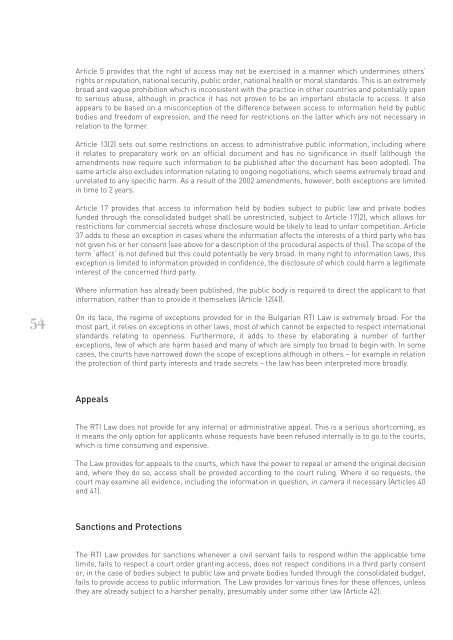Freedom of Information: A Comparative Legal Survey - Federation of ...
Freedom of Information: A Comparative Legal Survey - Federation of ...
Freedom of Information: A Comparative Legal Survey - Federation of ...
Create successful ePaper yourself
Turn your PDF publications into a flip-book with our unique Google optimized e-Paper software.
54<br />
Article 5 provides that the right <strong>of</strong> access may not be exercised in a manner which undermines others’<br />
rights or reputation, national security, public order, national health or moral standards. This is an extremely<br />
broad and vague prohibition which is inconsistent with the practice in other countries and potentially open<br />
to serious abuse, although in practice it has not proven to be an important obstacle to access. It also<br />
appears to be based on a misconception <strong>of</strong> the difference between access to information held by public<br />
bodies and freedom <strong>of</strong> expression, and the need for restrictions on the latter which are not necessary in<br />
relation to the former.<br />
Article 13(2) sets out some restrictions on access to administrative public information, including where<br />
it relates to preparatory work on an <strong>of</strong>fi cial document and has no signifi cance in itself (although the<br />
amendments now require such information to be published after the document has been adopted). The<br />
same article also excludes information relating to ongoing negotiations, which seems extremely broad and<br />
unrelated to any specifi c harm. As a result <strong>of</strong> the 2002 amendments, however, both exceptions are limited<br />
in time to 2 years.<br />
Article 17 provides that access to information held by bodies subject to public law and private bodies<br />
funded through the consolidated budget shall be unrestricted, subject to Article 17(2), which allows for<br />
restrictions for commercial secrets whose disclosure would be likely to lead to unfair competition. Article<br />
37 adds to these an exception in cases where the information affects the interests <strong>of</strong> a third party who has<br />
not given his or her consent (see above for a description <strong>of</strong> the procedural aspects <strong>of</strong> this). The scope <strong>of</strong> the<br />
term ‘affect’ is not defi ned but this could potentially be very broad. In many right to information laws, this<br />
exception is limited to information provided in confi dence, the disclosure <strong>of</strong> which could harm a legitimate<br />
interest <strong>of</strong> the concerned third party.<br />
Where information has already been published, the public body is required to direct the applicant to that<br />
information, rather than to provide it themselves (Article 12(4)).<br />
On its face, the regime <strong>of</strong> exceptions provided for in the Bulgarian RTI Law is extremely broad. For the<br />
most part, it relies on exceptions in other laws, most <strong>of</strong> which cannot be expected to respect international<br />
standards relating to openness. Furthermore, it adds to these by elaborating a number <strong>of</strong> further<br />
exceptions, few <strong>of</strong> which are harm based and many <strong>of</strong> which are simply too broad to begin with. In some<br />
cases, the courts have narrowed down the scope <strong>of</strong> exceptions although in others – for example in relation<br />
the protection <strong>of</strong> third party interests and trade secrets – the law has been interpreted more broadly.<br />
Appeals<br />
The RTI Law does not provide for any internal or administrative appeal. This is a serious shortcoming, as<br />
it means the only option for applicants whose requests have been refused internally is to go to the courts,<br />
which is time consuming and expensive.<br />
The Law provides for appeals to the courts, which have the power to repeal or amend the original decision<br />
and, where they do so, access shall be provided according to the court ruling. Where it so requests, the<br />
court may examine all evidence, including the information in question, in camera if necessary (Articles 40<br />
and 41).<br />
Sanctions and Protections<br />
The RTI Law provides for sanctions whenever a civil servant fails to respond within the applicable time<br />
limits, fails to respect a court order granting access, does not respect conditions in a third party consent<br />
or, in the case <strong>of</strong> bodies subject to public law and private bodies funded through the consolidated budget,<br />
fails to provide access to public information. The Law provides for various fi nes for these <strong>of</strong>fences, unless<br />
they are already subject to a harsher penalty, presumably under some other law (Article 42).
















